第36章
Whole families had been moving from the first towards the spot in the Higuerota range, whence the rumour of work and safety had spread over the pastoral Campo, forcing its way also, even as the waters of a high flood, into the nooks and crannies of the distant blue walls of the Sierras. Father first, in a pointed straw hat, then the mother with the bigger children, generally also a diminutive donkey, all under burdens, except the leader himself, or perhaps some grown girl, the pride of the family, stepping barefooted and straight as an arrow, with braids of raven hair, a thick, haughty profile, and no load to carry but the small guitar of the country and a pair of soft leather sandals tied together on her back. At the sight of such parties strung out on the cross trails between the pastures, or camped by the side of the royal road, travellers on horseback would remark to each other:
`More people going to the San Tome mine. We shall see others tomorrow.'
And spurring on in the dusk they would discuss the great news of the province, the news of the San Tome mine. A rich Englishman was going to work it -- and perhaps not an Englishman, Quien sabe! A foreigner with much money. Oh, yes, it had begun. A party of men who had been to Sulaco with a herd of black bulls for the next corrida had reported that from the porch of the posada in Rincon, only a short league from the town, the lights on the mountain were visible, twinkling above the trees. And there was a woman seen riding a horse sideways, not in the chair seat, but upon a sort of saddle, and a man's hat on her head. She walked about, too, on foot up the mountain paths. A woman engineer, it seemed she was.
`What an absurdity! Impossible, senor! '
` Si! Si! Una americana del Norte .'
`Ah, well! if your worship is informed. Una Americana ; it need be something of that sort.'
And they would laugh a little with astonishment and scorn, keeping a wary eye on the shadows of the road, for one is liable to meet bad men when travelling late on the Campo.
And it was not only the men that Don Pepe knew so well, but he seemed able, with one attentive, thoughtful glance, to classify each woman, girl, or growing youth of his domain. It was only the small fry that puzzled him sometimes. He and the padre could be seen frequently side by side, meditative and gazing across the street of a village at a lot of sedate brown children, trying to sort them out, as it were, in low, consulting tones, or else they would together put searching questions as to the parentage of some small, staid urchin met wandering, naked and grave, along the road with a cigar in his baby mouth, and perhaps his mother's rosary, purloined for purposes of ornamentation, hanging in a loop of beads low down on his rotund little stomach. The spiritual and temporal pastors of the mine flock were very good friends. With Dr Monygham, the medical pastor, who had accepted the charge from Mrs Gould, and lived in the hospital building, they were on not so intimate terms. But no one could be on intimate terms with El Senor Doctor, who, with his twisted shoulders, drooping head, sardonic mouth, and side-long bitter glance, was mysterious and uncanny. The other two authorities worked in harmony. Father Roman, dried-up, small, alert, wrinkled, with big round eyes, a sharp chin, and a great snuff-taker, was an old campaigner, too; he had shriven many simple souls on the battle-fields of the Republic, kneeling by the dying on hillsides, in the long grass, in the gloom of the forests, to hear the last confession with the smell of gunpowder smoke in his nostrils, the rattle of muskets, the hum and spatter of bullets in his ears. And where was the harm if, at the presbytery, they had a game with a pack of greasy cards in the early evening, before Don Pepe went his last rounds to see that all the watchmen of the mine -- a body organized by himself -- were at their posts? For that last duty before he slept Don Pepe did actually gird his old sword on the veranda of an unmistakable American white frame-house, which Father Roman called the presbytery. Near by, a long, low, dark building, steeple-roofed, like a vast barn with a wooden cross over the gable, was the miners' chapel.
There Father Roman said Mass every day before a sombre altarpiece representing the Resurrection, the grey slab of the tombstone balanced on one corner, a figure soaring upwards, long-limbed and livid, in an oval of pallid light, and a helmeted brown legionary smitten down, right across the bituminous foreground. `This picture, my children, muy linda e maravillosa ,'
Father Roman would say to some of his flock, `which you behold here through the munificence of the wife of our Senor Administrador, has been painted in Europe, a country of saints and miracles, and much greater than our Costaguana.' And he would take a pinch of snuff with unction. But when once an inquisitive spirit desired to know in what direction this Europe was situated, whether up or down the coast, Father Roman, to conceal his perplexity, became very reserved and severe. `No doubt it is extremely far away. But ignorant sinners like you of the San Tome mine should think earnestly of everlasting punishment instead of inquiring into the magnitude of the earth, with its countries and populations altogether beyond your understanding.'